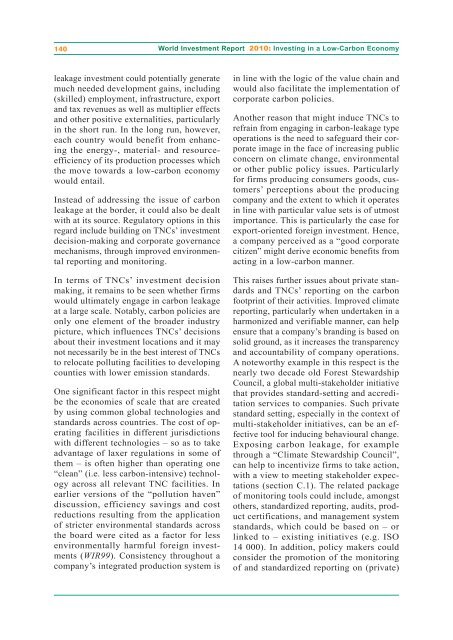UN World Investment Report 2010 - Office of Trade Negotiations
UN World Investment Report 2010 - Office of Trade Negotiations
UN World Investment Report 2010 - Office of Trade Negotiations
Create successful ePaper yourself
Turn your PDF publications into a flip-book with our unique Google optimized e-Paper software.
140<br />
leakage investment could potentially generate<br />
much needed development gains, including<br />
(skilled) employment, infrastructure, export<br />
and tax revenues as well as multiplier effects<br />
and other positive externalities, particularly<br />
in the short run. In the long run, however,<br />
each country would benefit from enhancing<br />
the energy-, material- and resourceefficiency<br />
<strong>of</strong> its production processes which<br />
the move towards a low-carbon economy<br />
would entail.<br />
Instead <strong>of</strong> addressing the issue <strong>of</strong> carbon<br />
leakage at the border, it could also be dealt<br />
with at its source. Regulatory options in this<br />
regard include building on TNCs’ investment<br />
decision-making and corporate governance<br />
mechanisms, through improved environmental<br />
reporting and monitoring.<br />
In terms <strong>of</strong> TNCs’ investment decision<br />
making, it remains to be seen whether firms<br />
would ultimately engage in carbon leakage<br />
at a large scale. Notably, carbon policies are<br />
only one element <strong>of</strong> the broader industry<br />
picture, which influences TNCs’ decisions<br />
about their investment locations and it may<br />
not necessarily be in the best interest <strong>of</strong> TNCs<br />
to relocate polluting facilities to developing<br />
counties with lower emission standards.<br />
One significant factor in this respect might<br />
be the economies <strong>of</strong> scale that are created<br />
by using common global technologies and<br />
standards across countries. The cost <strong>of</strong> operating<br />
facilities in different jurisdictions<br />
with different technologies – so as to take<br />
advantage <strong>of</strong> laxer regulations in some <strong>of</strong><br />
them – is <strong>of</strong>ten higher than operating one<br />
“clean” (i.e. less carbon-intensive) technology<br />
across all relevant TNC facilities. In<br />
earlier versions <strong>of</strong> the “pollution haven”<br />
discussion, efficiency savings and cost<br />
reductions resulting from the application<br />
<strong>of</strong> stricter environmental standards across<br />
the board were cited as a factor for less<br />
environmentally harmful foreign investments<br />
(WIR99). Consistency throughout a<br />
company’s integrated production system is<br />
<strong>World</strong> <strong>Investment</strong> <strong>Report</strong> <strong>2010</strong>: Investing in a Low-Carbon Economy<br />
in line with the logic <strong>of</strong> the value chain and<br />
would also facilitate the implementation <strong>of</strong><br />
corporate carbon policies.<br />
Another reason that might induce TNCs to<br />
refrain from engaging in carbon-leakage type<br />
operations is the need to safeguard their corporate<br />
image in the face <strong>of</strong> increasing public<br />
concern on climate change, environmental<br />
or other public policy issues. Particularly<br />
for firms producing consumers goods, customers’<br />
perceptions about the producing<br />
company and the extent to which it operates<br />
in line with particular value sets is <strong>of</strong> utmost<br />
importance. This is particularly the case for<br />
export-oriented foreign investment. Hence,<br />
a company perceived as a “good corporate<br />
citizen” might derive economic benefits from<br />
acting in a low-carbon manner.<br />
This raises further issues about private standards<br />
and TNCs’ reporting on the carbon<br />
footprint <strong>of</strong> their activities. Improved climate<br />
reporting, particularly when undertaken in a<br />
harmonized and verifiable manner, can help<br />
ensure that a company’s branding is based on<br />
solid ground, as it increases the transparency<br />
and accountability <strong>of</strong> company operations.<br />
A noteworthy example in this respect is the<br />
nearly two decade old Forest Stewardship<br />
Council, a global multi-stakeholder initiative<br />
that provides standard-setting and accreditation<br />
services to companies. Such private<br />
standard setting, especially in the context <strong>of</strong><br />
multi-stakeholder initiatives, can be an effective<br />
tool for inducing behavioural change.<br />
Exposing carbon leakage, for example<br />
through a “Climate Stewardship Council”,<br />
can help to incentivize firms to take action,<br />
with a view to meeting stakeholder expectations<br />
(section C.1). The related package<br />
<strong>of</strong> monitoring tools could include, amongst<br />
others, standardized reporting, audits, product<br />
certifications, and management system<br />
standards, which could be based on – or<br />
linked to – existing initiatives (e.g. ISO<br />
14 000). In addition, policy makers could<br />
consider the promotion <strong>of</strong> the monitoring<br />
<strong>of</strong> and standardized reporting on (private)

















